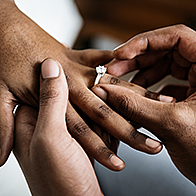A Closer Look at Marriage Versus Domestic Partnership

There's more than one way to get hitched. Marriage is the go-to picture of legally recognized coupling, but depending on where you live, you and the significant other in your life might have options such as a domestic partnership, civil union or civil partnership. These institutions, along with the concept of common-law marriage, are part of a spectrum of options for Americans who wish to partner domestically or legally without pursuing a marriage license.
Each nonmarital union has different parameters, and each can be defined differently in different parts of the country. However, these unions do overlap in many ways, and because the differences can be so minute, for our purposes, we'll refer to all of them as domestic partnerships.
State of the union
Marriage isn't treated exactly the same everywhere you go, but it's safe to say that in the United States, the rights of a married spouse are supposed to be universal. The security and overall benefit afforded to this status nationwide is what prompted the creation of domestic partnerships and civil unions as members of the LGBTQIA+ communities fought for equal recognition under the law.
Though domestic partnerships manifested as something of a marriage alternative for same-sex couples, it's quite evident that they're not treated as being equal to marriage. Some states may not even recognize a domestic partnership from another state as being valid.
Consider also that domestic partnerships were adopted in some states that still have bans in place for same-sex marriages—even after federally implemented changes brought about in 2015 by the Supreme Court's decision regarding Obergefell v. Hodges, which guaranteed married same-sex couples rights equal to married heterosexual couples under the law.
Since that historic legal decision, the advancement and development of domestic partnerships has languished. After all, the primary motivation for their creation within each state had become effectively irrelevant. Still, there are partnerships of all orientations who wish to share the same privileges that married couples enjoy without having to go quite so far.
If you're considering marriage, it may be helpful to review this state-by-state guide clarifying the status of marriages, civil unions and domestic partnerships.
Money matters
The state you live in might view a domestic partnership as being comparable to marriage, but the IRS certainly does not.
Domestic partnerships must navigate a complex set of rules when it comes to income, property and other revenue and tax-related matters. For most people, the key point to be aware of is that a domestic partnership is simply not recognized as a spousal relationship by the IRS. This means two people registered in a state-acknowledged domestic partnership must file their taxes as "single" instead of "married." For some people, this may be a benefit. Others may wish to retain joint filing status, in which case marriage would be preferable to a domestic partnership.
Domestic partners may also find shared property or joint responsibilities more difficult to navigate than their married peers. A shared business, communal assets or property, children and other aspects of a shared life all need to be dealt with a little bit differently in a domestic partnership than in a marriage.
Individuals joined by marriage in the financial sense typically have a more straightforward path toward money management than domestic partnerships. But for any number of reasons, either arrangement might be more suitable for an individual's particular financial practices and goals. The important key is to be on the same page with the person you intend to marry or join in a domestic partnership. For a fairly detailed overview of how domestic partnerships differ from marriages according to the IRS, take a look at these frequently asked questions.
Choose your own adventure
Of course, there's nothing wrong with avoiding a legally recognized union altogether. There are significant consequences to either getting married or becoming part of a domestic partnership, so it's hard to blame a person for wanting to stick with "single" as their filing status without any addendum or complication.
One detail to think about is that a domestic partnership can be just as difficult or easy to dissolve through divorce as a marriage. You may be interested in domestic partnership as an alternative to marriage because you foresee the arrangement being less messy should the relationship not work out, but the truth is that the process for ending either relationship is about the same.
Ultimately, the decision is up to you and your partner. Hopefully, by utilizing some of the resources available to you and by talking openly with that person, finding the best legal status for both of you will be easy.


















